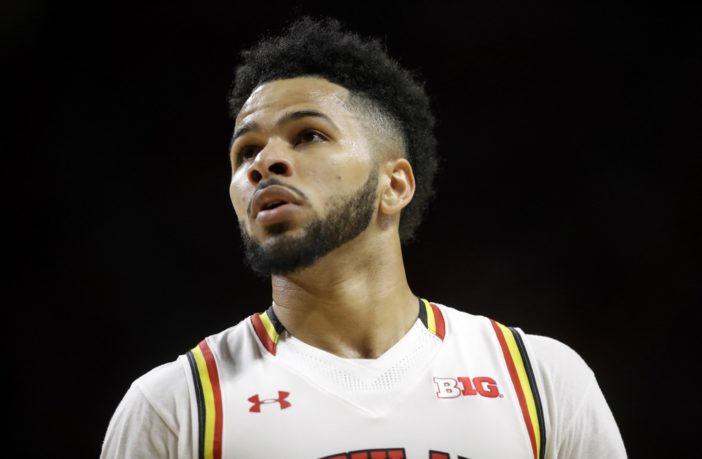By MICHAEL KUNZELMAN , Associated Press
COLLEGE PARK, Md. (AP) — Two former University of Maryland men’s basketball players are suing the makers of “Fortnite,” claiming the video game’s creators misappropriated a dance they popularized online.
The federal lawsuit, filed Monday in Maryland, accuses Epic Games Inc. of unfairly profiting from the “Running Man Challenge” dance that Jared Nickens and Jaylen Brantley performed in social media videos and on “The Ellen DeGeneres Show” in 2016.
In this Wednesday, Feb. 22, 2017 photo, Maryland guard Jaylen Brantley walks on the court in the second half of an NCAA college basketball game against Minnesota, in College Park, Md. Brantley and Jared Nickens, two former University of Maryland men’s basketball players, are suing the makers of “Fortnite,” claiming the video game’s creators misappropriated a dance they popularized online. The federal lawsuit, filed Monday, Feb. 25, 2019, in Maryland, accuses North Carolina-based Epic Games Inc. of unfairly profiting from the “Running Man Challenge” dance that Nickens and Brantley performed in social media videos and on Ellen DeGeneres’ TV show in 2016. (AP Photo/Patrick Semansky)
The “Running Man” dance that “Fortnite” players can purchase for their characters is identical to the dance that Nickens and Brantley take credit for creating, their copyright infringement lawsuit claims.
Other artists, including Brooklyn-based rapper 2 Milly and “The Fresh Prince of Bel-Air” star Alfonso Ribeiro, also have sued Epic Games over other dances depicted in the shooting game. Celebratory dances in “Fortnite” are called “emotes.”
Epic Games spokesman Nick Chester said in an email Tuesday that the company based in Cary, North Carolina doesn’t comment on pending litigation.
In response to the lawsuit Ribeiro filed in California, Epic Games attorneys argued that “no one can own a dance step or a simple dance routine.”
“Fundamentally, this suit is at odds with free speech principles as it attempts to impose liability, and thereby chill creative expression, by claiming rights that (Ribeiro) does not and could not hold,” they wrote in a court filing last Friday, urging the court to throw out his lawsuit.
The U.S. Copyright Office denied Ribeiro a copyright for the “Carlton” dance that his character performed on the 1990s sitcom.
“Copyright law is clear that no one can own individual dance steps or simple dance routines made up of multiple steps as they are building blocks of free expression, which are not protected by copyright,” company attorneys wrote.
Nickens and Brantley appeared on DeGeneres’ talk show alongside two New Jersey high school students who were posting videos of the dance online before the two University of Maryland basketball players filmed their own version. Brantley told DeGeneres that Nickens first showed him the dance in a video on Instagram.
“We dance every day for our teammates in the locker room,” Brantley said. “We were like, ‘Hey, let’s make a video and make everybody laugh.’”
One of their dance videos has millions of views on Instagram, YouTube and Facebook, their suit says.
Brantley, of Springfield, Mass., and Nickens, of Monmouth Junction, N.J., are seeking more than $5 million in damages.
“They have never made a nickel off of their creation,” said their attorney, Richard Jaklitsch.
Nickens is currently playing professional basketball in Canada, while Brantley is working as a sports agent, according to their lawyer.


